They are as decorated a couple as can be. He has been the 19th Chief of Army Staff of the prestigious Indian Army, the second largest army in the world. She is a doctor, a Captain (Retd.) of the Indian Army and a former President of the Army Wives Welfare Association (AWWA). He led the Indian army in the Kargil War and spearheaded Operation Vijay, which led to Pakistan’s defeat, while she helped keeping the morale of the soldiers and their families up during the war. Meet Dr. Ranjana and General (Retd.) Ved Prakash Malik, a couple who is an inspiration for every Indian. Corporate Citizen chats with India’s Decorated Duo about the life in the army, secret of their marriage, and how the armed forces transforms not just the individuals, but also the entire families
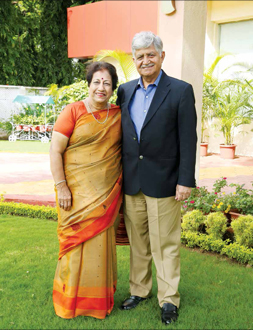
General Malik: There were many reasons. Primarily, it was because of my family. A large number of people from my family have been in the armed forces, and I wanted to follow the suit. The other reason is that in 1955, when I joined the NDA, the Armed forces was a very respected organisation, and at a time when India was newly independent and we didn’t have a lot of job opportunities. The options for me were either to become an engineer or join the Army as an officer. Fortunately, I got through the NDA entry examinations, and soon after I finished my matriculation, I joined the Army, and I haven’t regretted it since.
Ranjana Malik: I grew up in Dehradun, where the Indian Military Academy (IMA) is located. Growing up, I would see cadets all around the city, and I became inspired by their values and discipline. At that time, I completed my medical degree from Lady Hardinge Medical College in Delhi, and then joined the Armed Forces, where I was commissioned as a Captain. I served the Army for five years, after which I joined the Oil and Natural Gas Commission (ONGC) as a doctor, and was with the institution for 20 years. I took premature retirement when Malik was a Corps Commander, to support him and play a supportive role in the Army.
Rajana: We met before I joined the Army. We saw each other at a party when he was a Major and I hadn’t yet joined the Army as yet. We remained in touch after that. We communicated entirely by letters, and we got to know each other better. I feel when you aren’t emotionally involved when you are getting to know someone, you are much more objective and you see the person for what he/she is. Through letters, we got to know everything about each other. Eventually, we decided we were right for each other and decided to get married. I like to say that the romance with the uniform blossomed into romance with the man-in-uniform. We got married in 1968. It will be 49 years this September since we got married.
Gen. Malik: I loved her outlook towards life. She was well mannered and extremely well read. She could express herself very articulately, and during our conversations, I realised that she had so many values that we shared, and that we were perfect for each other.
Ranjana: I was impressed with the way he was and of course I saw that he had leadership potential, but there was no way I could have predicted he would lead the Army one day.
Ranjana: Fortunately, there was no opposition. We told our families, and they were very supportive. We were adults and both of us were in the Army, which was considered very respectable, so it went quite smoothly for us.
Ranjana: You have to give each other respect. You have to value each other’s opinions. You shouldn’t impose your beliefs on your partner. In the Army, we spent several years living wihout each other. He was in field areas most of the time. I was home alone. Absence makes the heart grow fonder. Because we met after stretches of time, we made the most of the time we had. We couldn’t afford to fight, as the time we had together was short at that time.
Gen. Malik: I believe it’s the commonality of values, which is the key to a successful marriage. Values including commitment, trust and understanding create the longevity in the companionship.
Gen. Malik: We have a son and a daughter. Our son, Sachin, serves in the Army. He followed my footsteps and is in the same regiment as me, the Sikh Light Infantry. He is also married to an Army Doctor. Our daughter Namita is an engineer, and has done her MBA in the US. She works in corporate finance. She is senior VP at Diageo.
Ranjana: I am quite disciplined myself, even though I wasn’t from an Army background. I feel, for working parents, there has to be time management and a certain schedule. Therefore, discipline is anyway necessary for the upbringing of children. While growing up, we did worry whether we were being too strict, but when our son grew up and said he wanted to marry an Army doctor, we figured we must have done something right (laughs).
Gen. Malik: Children, who grow up in an Army environment are subjected to discipline, especially when it comes to manners and the way they conduct themselves, but they also get many opportunities growing up, whether it is sports, the opportunity to travel and meeting people from different backgrounds. They grow up much more open minded than children who aren’t exposed to this environment. They become more adaptable and social. Our children changed seven to eight schools all over the country and they have become more enriched as a result of that.
Ranjana: The more exposure children get at a younger age, the better they do in life, whichever field they may choose.
‘When you marry a soldier, you don’t marry the individual alone, you marry a way of life. This way of life is different from any other career out there. You learn to belong, you learn to listen to your seniors, and you learn to take care of the people under you’
— Ranjana
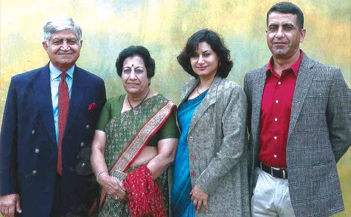
Gen. Malik: You must keep motivating the soldiers. You must visit them on the ground, and ask them if they are facing any problems whatsoever, and you keep rekindling the patriotism inside them. Our soldiers are very simple. They have few wants. They are extremely patriotic, and they deliver as long as they know that they have good leaders, who will guide and support them.
Ranjana: They are so charged that even when they are injured and lying in the hospitals, they say that they want to be healed soon so that they can go back to their posts and serve the country.
Gen. Malik: This happened with me once. I had gone to the Srinagar hospital with the then Prime Minister. We saw a soldier who was badly wounded. We went to him and the PM asked, “Main aap ke liye kya kar sakta hoon?” and the soldier replied “Sir, jaise hi main theek hota hoon, mujhe wapas bhej deejiye ladne ke liye”. This is the kind of spirit our soldiers have.
Gen. Malik: At the lower level, to some extent, it does affect creativity. The kind of discipline that the Army exercises in order to maintain uniformity and standard operating procedures can be rigid, but the upside is that un-like any other profession, we start training our people for leadership from a very early stage. As soldiers rise above in the ranks, the scope for creative thinking also increases.
Gen. Malik: When you join the Army, you are joining an organisation, which not just looks after you, but your whole family. Spouses of the Army also become part of the Army, and play a big role. The Army is such a close knit unit because there is a bonding not just amongst the soldiers, but also amongst the fami-lies of the soldiers. If I went into the field, then my wife, as head of the Army Wives Welfare Association (AWWA), took care of the families of the other soldiers at the family centre.
Ranjana: When you marry a soldier, you don’t marry the individual alone, you marry a way of life. This way of life is different from any other career out there. You learn to belong, you learn to listen to your seniors, and you learn to take care of the people under you. In those days, there wwere very few telephones and no phones at all in border areas. I didn’t want Mr Malik to miss out on our children growing up, so I ensured that I wrote to him every single day, and also made the children write whatever they want in the letters. It took around three weeks for the letters to reach him and another three weeks to receive a reply, which was a huge gap. Therefore, I wrote every day without failing so that he wouldn’t feel left out on the daily lives of his family
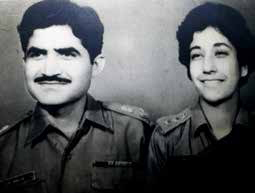
Ranjana: The role of AWWA is enormous. We looked after the officers’ and Jawans’ families, when they were at the border. We took care of the martyrs’ families. It was our responsibility to look after the injured soldiers. We have welfare centres, which we run. We also look into domestic problems or marital problems of the soldiers if they come to us with them. AWWA representatives were there when the bodies of martyrs were received by grieving family members to comfort them. We provided vocational training to the wives of the soldiers. We trained them in multiple skills so that they can find livelihoods for themselves. We are there as a backbone to provide any help soldiers and their families require. Even today, all the martyrs’ families know me personally because I have visited every one of them.
Gen. Malik: Unfortunately, not many people know about AWWA. It is a unique organisation in the world. People from the US and UK Army too have shown admiration about AWWA. They have said that they are impressed with the role that Army wives play in the Indian Army.
Ranjana: I have written a lot about this. The major question is whether women should be sent into combat as of now and I feel it isn’t time for that yet. We have Army women in medicine (I am one of them, and I had joined 50 years ago), judicial services and engineering now, but I don’t think we are ready to put them in combat as yet.
Gen. Malik: Every country follows its own social norms, in any organisation. The Indian armed forces too have to follow these norms. As for women in combat, it is more or less similar around the world. There are women in combat in some armies, but they have a limited role as of now. If there is a change in the social environment, we will certainly consider that in the future. Today’s Army is a lot different from what it was 20 years ago and what it would be in the next 20 years, we never know.
‘Information Technology has a flipside. The kind of intimacy and trust that existed earlier cannot be replicated through social media and gadgetry. They can never be a substitute for actual human contact and face to face interaction’
— Gen. Malik
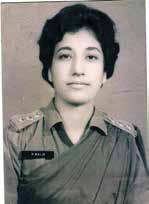
Gen. Malik: We love to go out, whether it is vacations, trekking or even long walks. We played sports together. Our children are voracious readers. They picked that quality from us (laughs).
Ranjana: This is not a welcome change. They have lost the command over language, they have forgotten how to write a grammatically correct sentence or articulate themselves properly.
Gen. Malik: Information Technology has brought about many positive changes. However, there is a flipside. Especially in social activities. The kind of intimacy and trust that existed earlier cannot be replicated through social media and gadgetry. I tell youngsters to not spend too much time on these devices. They can never be a substitute for actual human contact and face to face interaction. If during the war, instead of visiting ground zero, I only sent them a WhatsApp message, will it motivate the troops? Absolutely not.
Gen. Malik: It is a great companionship we have and we hope it continues and builds.
Ranjana: I believe in living life to the fullest. That is my philosophy towards marriage as well as life. I believe in making the best of each day as a couple, and being thankful.
The Indian Army is one of the most respected institutions in India, and one of the proudest moments in India’s history came when the Indian Army won the Kargil war, defeating Pakistan. The man behind this spectacular victory is General (Retd.) V P Malik, who served as the Chief of Army Staff during the Kargil War. At a recent event at a management college, General Malik communicated his formula for leadership, and drew parallels between the functioning of the Army with that of a corporate organisation. Corporate Citizen brings you the riveting speech as the General imparted life changing advice while reminiscing about his experiences in the Kargil War
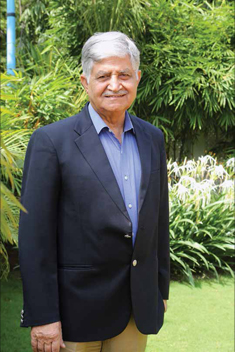
General V P Malik has led a very inspiring life. He was born on 1st November 1939 in Dera Ismail Khan, North West Frontier Province, British India (now in Pakistan). An alumnus of the National Defence Academy, Khadakwasla and the Indian Military Academy, Dehradun, Gen. Malik was commissioned into 3 SIKH LI on 7th June 1959. He commanded an Infantry Brigade in Jammu and Kashmir where he was awarded the Ati Vishisht Seva Medal (AVSM).
In December 1989, he was appointed GOC of a Mountain Division and in August 1992, he assumed command of a Corps in Punjab, where he oversaw anti-militancy operations in the state.
In Jul 1995, he was appointed GOC-in-C of Southern Command before moving to the Army Headquarters as Vice Chief of Army Staff in August 1996. He was decorated with the Param Vishisht Seva Medal (PVSM) in 1996. He assumed the charge of the Indian Army as the 19th Chief of Army Staff on 1st October 1997. Concurrently with the appointment, he took over as Chairman, Chiefs of Staff Committee of India with effect from 1st Jan 1999. He coordinated and oversaw the planning and execution of Operation Vijay to successfully defeat Pakistan's attempted intrusion in the Kargil sector during May to July 1999.
He was felicitated with the ‘Excellence in Leadership’ award by the Atur Foundation, Pune and also the ‘Distinguished Fellowship’ of the Institute of Directors, New Delhi in 1999. The Doon Citizens' Council gave him the 'Pride of the Nation' award in July 2000. He was Colonel of the Sikh Light Infantry from 1990 to 1998, and continues to be Honorary Colonel of the Regiment for life.
Excerpts from his speech:
India, today, is a land of opportunities. We have strong economic fundamentals, and I can vouch for it because I am on the board of six companies. We are the third largest economy in the world. Our children are making their mark around the world. We have the biggest demographic dividend unlike countries like Japan, Portugal, Italy and Spain, which have a large number of senior population. India is a young country and it requires young leaders, whether it is in the army, politics, or the corporate world. The principles of leadership are universal, whether you lead the army or a company. So how do you become a good leader? I believe there are some necessary qualities to be a good leader, which I will elaborate in detail.
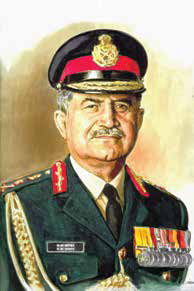
I learnt as a young officer how to lead, and those principles have applied to me all my life. You must be a leader not just to your immediate subordinates, but to everyone under you. You must listen to everyone. As an Army Chief, the chain of command is so far high that many people can't talk to you directly. If they have to reach you, there is a hierarchy. During the Kargil war, there was a Lieutenant-Colonel, who wrote a letter to me saying that his battalion, which was to be transferred to another place, had been stopped and instructed to fight the war, and was told to attack, but they did not have enough weapons to fight. I was perturbed by the letter. The next morning I flew to Srinagar, and had a long conversation with teams on the ground and got an idea of the actual shortage of equipment. As a chief, I was able to procure equipment from Kolkata, Chennai and other areas, to the extent it was possible. Before leaving, I gave instructions that the person who wrote me the letter should not be reprimanded for breaking hierarchy, as he had done a very good job in informing me, and his actions may have saved lives. Later on, the officer became a Brigadier, and I was very happy with his progress.
You need to earn the trust of your people. This trust is not part of your theoretical knowledge. It comes from the way you conduct yourself. You must be a part of a team. Success is sweeter when everyone is involved, not just you. A leader will make every member of his team feel valued. In any organisation, there are people doing different tasks. You have to synchronize their activities in a manner that makes the organisation function like a welloiled machine. This applies to the army as well as corporate life. Team work is an orchestra which requires team effort and harmony with each other.
Communication is also an area you must focus on. Communication doesn’t just mean speaking a language. It involves your body language, the way you carry yourself, the way you relate to the person you are speaking with, etc. There is a quote from the 'Art of War', which goes like this-“ If words of command are not clear and distinct, if orders are not thoroughly understood, the general is to blame."
Character is the sum total of the good and bad in you. If there are more good qualities in you than bad, then your character is good. If it is vice versa, then you are unfit to be a leader. A leader should also lead by example. When I became the Army Chief, I felt that I should not be taking a gift from anyone, as it would be unethical. I remember that once during Diwali, somebody brought a crate with liquor and dry fruits to me, even though I had explicitly said that I would not be accepting gifts. I returned the crate to the same officer, with a letter saying "Don't try this again". I put the letter on display so that everyone could see it and get the message. They understood then that I meant business, and this sort of behaviour would not be tolerated.
A leader should also have priorities. Mine were as follows. The safety, honour and welfare of the country come first, the honour, welfare and comfort of the men I commanded come next, and my own ease, comfort and safety come last.
Leaders will never avoid challenges. There is a symbiotic relationship between leadership and challenges. Leaders must be action oriented. Even the Bhagwat Gita says that all action, without exception, culminates in knowledge. When the Kargil war started, everyone was apprehensive. But at the end of it we were all smiling. The end of a policy is more important than the beginning.
Leaders do not automatically become leaders because they are born to become leaders. If they do not have leadership qualities they will not be accepted. Leaders are forged from their own life experiences. They are 100% self-made. Leadership cannot be handed over on a silver platter. As a leader, you cannot be seen as someone who isn’t sure of himself. In the beginning of the Kargil war, we weren’t sure if it was the enemy or militants who instigated it. I said that before we proceed on a plan of action, I wanted to be sure who the attackers were, (as protocol for engaging with the enemy is quite different from engaging with militants from your own country). I ensured that we know we were dealing with the Pakistani army before I went to the government with a plan of action.
‘Leaders do not automatically become leaders because they are born to become leaders. If they do not have leadership qualities they will not be accepted. Leaders are forged from their own life experiences. They are 100% self-made’
By Neeraj Varty